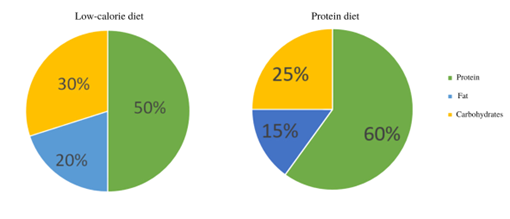The reasoning behind the birth of protein diets was clear: How to make it so that the body loses weight preferentially at the expense of stored fat and leaves alone the proteins from its muscle tissue as a metabolically closer source of stored energy. And is it possible at all?
The task was mastered by Dr. Blackburn (later a professor at Harvard in the USA), who formulated the Protein Sparing Modified Fast protocol in 1973 ("protein sparing modified fasting"). This laid the foundation for so-called ketogenic diets.
By supplying a sufficient amount of high-quality proteins while simultaneously restricting carbohydrates, the organism naturally enters the so-called ketosis* (hence the designation of protein diets as "ketogenic") and subsequently reduces body weight mainly at the expense of adipose tissue, which can be objectified by measurement on a bioimpedance scale. The genius of Blackburn was in the simplicity of the solution. The body receives a hyper-protein and strictly low-calorie diet with plenty of vegetables and thus enters a state of fasting without feeling hungry. So it is a hunger strike without the knowledge of the client.
Compared to simple low-energy diets, there is a change in the order of mobilization of energy reserves: Carbohydrates (glycogen) - fatty acids (fat tissue) - proteins (muscle tissue).
The cumulative effect of hyper protein diet or weight loss in four phases
From the point of view of one MEDIDIET® product, it is a classic low-calorie diet with increased protein content and reduced carbohydrate and fat content.
From the point of view of the MEDIDIET® program as a whole, which provides for the replacement of several daily meals with protein preparations, the method becomes a classic ketogenic* diet, during which the client reduces preferentially at the expense of his fat tissue and the whole process begins others function as "protein** sparing modified fast***"
The difference between a regular low-energy diet and a protein diet from the point of view of the representation of individual nutrients

From this simple graph, several fundamental insights emerge:
-
The MEDIDIET® protein diet is not carbohydrate-free
-
The MEDIDIET® protein diet is close to a fat-free diet
-
MEDIDIET® protein preparations cannot be substituted for preparations from regular low-energy diets or proteins intended for bodybuilding
-
The MEDIDIET® protein diet works as a ketogenic diet only if the relative representation of individual nutrients is respected, i.e. with an increased supply of proteins and a reduced supply of carbohydrates and fats